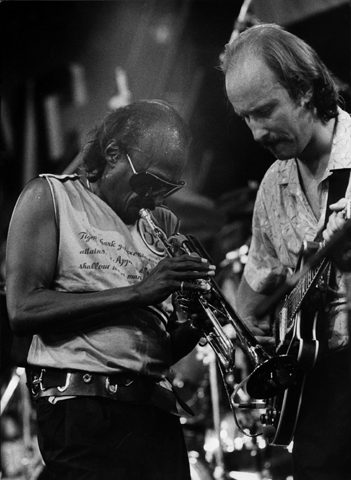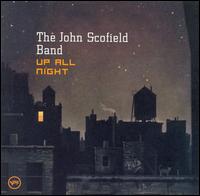
A FIRESIDE
CHAT WITH JOHN SCOFIELD
(April
21, 2003)
Say
what you will about John Scofield, but he plays a mean guitar. So it should
be to no one's great surprise that he is playing some mean guitar on his
latest album, Up All Night. I am hip to the electronica and Paul Oakenfold
or Digweed he is not, but Sco sure can get the ladies to shake their hips
and who doesn't like a little hip shaken. Also, if any of you should see
him, I am looking for the wingman. I owe him a Coors Light. Wang Chung
everybody. I present Mr. John Scofield, unedited and in his own words.
FRED
JUNG: There has been a change in your band since we last spoke.
JOHN
SCOFIELD: From last year, it is a different bass player named Andy Hess.
The old bass player, Jesse Murphy left to pursue some other stuff, so
we got another great bass player. I auditioned fourteen bass players and
picked this one, Andy. It's an intangible thing a lot of times, but it
just seemed like he really, first of all, all the bass players were good,
but he had this old school bass approach, really playing the bottom and
I could tell he loved playing in a rhythm section, playing funky and also,
he liked to let the music kind of stretch out and listen to me and go
other places that I suggested. He sort of followed that. So those were
unstated things in music.
FJ: And the new group is featured on your latest, Up All Night.
JOHN
SCOFIELD: We were in the studio for three days. One of the reasons the
record is called Up All Night is that this time we went to a recording
studio on a farm in Massachusetts in the country and it was all snowy
and beautiful. We just stayed in this farmhouse and recorded right there.
So we were able to record until we wanted to stop, which meant we stayed
up all night every night playing. This music was different than on some
projects because it was a working band and we had started working on a
lot of these songs and working on the concept of the way we play together
a year and a half before that or more. So when we went in the studio,
we were pretty set on the tunes. We ended up doing some editing with this
Pro Tools device that they have now, which is the scariest thing I've
ever seen because you can really fix any errors. But pretty much, we left
it the way it was. It is not a Pro Tools session or an edited session
like some people make records. As a matter of fact, Fred, it is really
the way we play live even though there is a lot of sampling and electronics
stuff. We did it live. We didn't overdub it. That is the way the band
is. We play and use a lot of electronics stuff, but it is in real time.
It is not layered like the way they make pop records or hip-hop records.
FJ: There is a taboo that is associated with the words samples or electronics.
JOHN
SCOFIELD: Yeah, sure, it is something that is used in hip-hop and rap
music, but there is this whole other area of music that is not jazz per
say, that is sort of ambient music or house music that is in this electronica
world that most jazz people don't even know about. That is art music too
of another kind that is using electronics sampling and these type of devices.
It is sort of weird. It is sort of like the electronic music avant-garde
has met jazz improvisers. Yeah, I really like the electronic possibilities
for this band. It puts it in a certain way. I also play straight-ahead
jazz. If I was playing with another group and say that we were swinging
and playing a tune, it might be inappropriate, some of that electronics
stuff. New technology doesn't mean anything until it is in the hands of
somebody who is creative and then it can be really great.
FJ: You seem pretty hip to electronica?
JOHN
SCOFIELD: Well, you know what, Fred? I am not even that aware of it. I
am aware of it in that there has always been this growing thing with technology
ever since they started to use synthesizers. Trance music and stuff from
Europe, people would just tell me about it and give me CDs because I am
already out there and because it is a kind of art music sort of related
to jazz in that it is not pop music. You hear about it. You see festivals
with people playing. I am by no means an aficionado of this music, but
it is more of the technical end that I see and understand what people
are doing because now I own a sampler and mess around a little bit. I
am not a student of that stuff, but I see the similarity and I really
like the process, but I am not really that up on it as far as being a
fan.
FJ: The band is not confined to the conventional jazz club because your
willingness to explore modern themes.
JOHN
SCOFIELD: First off, this band, we don't really play the jazz clubs anymore.
When I have my trio with Steve Swallow and Bill Stewart and I am a member
of the group ScoLoHoFo with Joe Lovano, Dave Holland, and Al Foster, we're
more in the jazz thing. This band plays rock clubs pretty much. It is
where the music works, where there is a big PA and we are able to play,
at times, moderate rock and roll volume to people standing up. That's
the way it works. That is why we really don't play as much in the jazz
clubs. Once and a while we will in certain places that are called jazz
clubs, but generally, it works better in another venue type situation.
We don't really change the music to play anywhere. I think this music
works best in a small theater or big club type format. I don't think any
type of music really works in Madison Square Gardens.
FJ: And your band becomes a catalyst for electric Miles or late Trane.
JOHN
SCOFIELD: Hopefully, they would go into real jazz. I would like that to
happen because I love jazz and our music is informed so much by jazz.
We wouldn't exist if it wasn't for modern jazz and bebop. Even though
it is really electric funk, it is not the same as James Brown. There is
something else in there. Maybe it is not a funky as James Brown either.
I would hope that these jam band kids could get into jazz. The Grateful
Dead and those bands, they improvised. They improvised for real. Somebody
might not like the way they improvised or think that they are really as
good at it as great jazz players and I would have to agree, but they do
improvise and they stretch out and that is why a lot of these kids are
going to groups like my group.
FJ: With the rigors of travel further burdened by recent events, have
you curtailed the demanding touring schedule?
JOHN
SCOFIELD: We are going to Europe next month for four weeks and then I
will doing a lot more Europe stuff next fall, but we are actually staying
home to spend June, July, August in the States when there are a lot of
festivals and concerts and usually, I am in Europe at that time. I haven't
been to Europe since we invaded Iraq. I have a feeling that it is business
as usual. People have been worried about traveling since 9-11 and I got
on a plane and went to Mexico City a week after 9-11. It hasn't slowed
me down at all. There might be some anti-American feeling in Europe because
of the political situation, but the music world is so non-unilateral.
There are American musicians in Europe and each European country embraces
world music and the European music scene embraces this world thing. We
have been lucky. The American musicians have yet to play all around the
world and we actually know that it is a big world out there. Sometimes
I wish some of our politicians were a little bit more aware of that. I
don't worry about traveling in Europe at all. You might get a few more
funny looks from some Frenchman, who sees an American, but to tell you
the truth, there has always been a lot of suspicion by ignorant people,
but most people, certainly the people we run with, they recognize a person
for a person no matter what country he's from.
FJ:
And the future?
JOHN
SCOFIELD: This record just came out and we are going to be on the road
with this band and I am really looking forward to seeing how loose we
can get with it, how we can really get into making the music a little
bit different each night and just following each other. That is my person
kind of goal. I got this trio with Steve Swallow and Bill Stewart that
I played with for many, many years. We are more of a traditional jazz
group and we are going to be playing at the Blue Note next December and
we are going to record the band then and it will come out a year from
now. Then I am touring with that band the next summer and that will be
another direction that is different from the Up All Night record. I am
still a jazz guy too, trying to be (laughing). People are really confused,
jazz people and stuff. They say, "How can you do this and that? Which
are you?" I am not confused. I just play in these different areas.
There is a lot of music that I don't explore. But I am a little bit diverse
and eclectic compared to some people and I am lucky. I get to do a couple
of different bands and it is not difficult for me to go between playing
with this trio and playing with the band on Up All Night. They make each
other better. They allow me to not get stale in either area. If I just
did one thing, I might get a little tired of it.
Fred Jung is the Editor-In-Chief and is Wang Chunging tonight. Comments?
Email Him

